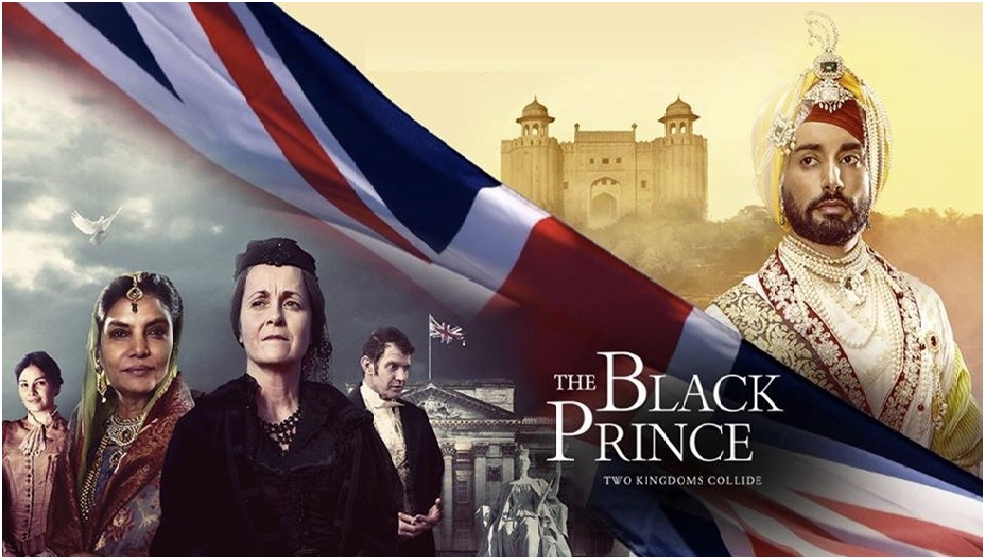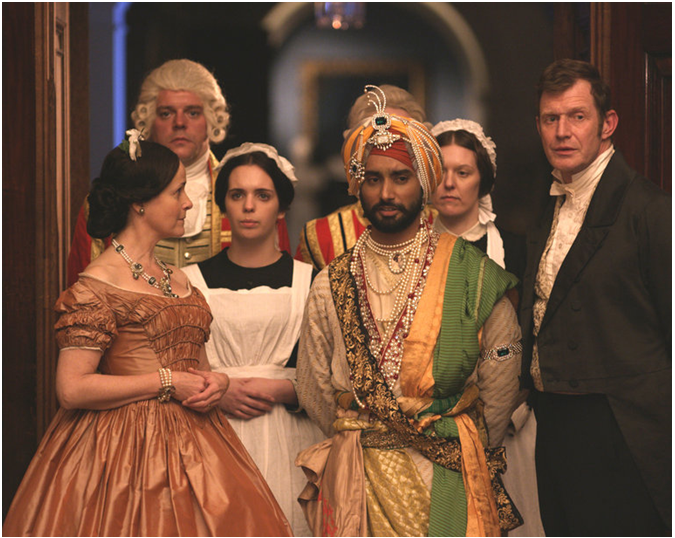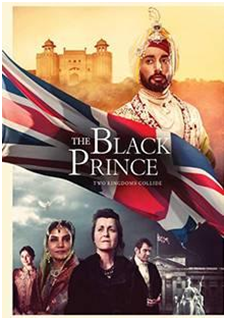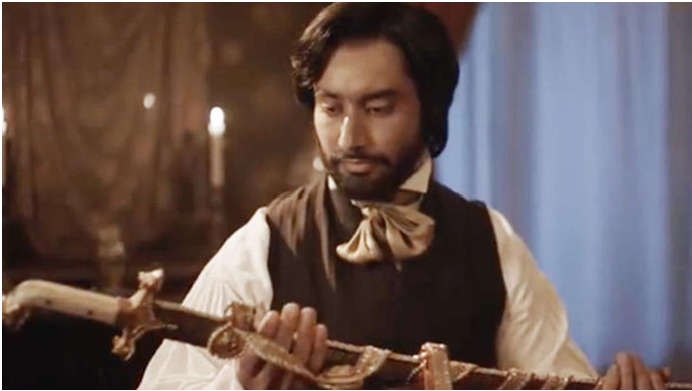


Based on the real story of the last king of Punjab.Stolen as a child. Exiled from his kingdom.One man will discover.
F.S.Aijazuddin
Revivalists of Punjabi nationalism face an uphill task.

THE BLACK PRINCE
Directed by Kavi Raz
Drama, History PG-13
By RACHEL SALTZ JULY 20, 2017

From left to right, Amanda Root, Satinder Sartaaj and Jason Flemyng in “The Black Prince,”
directed by Kavi Raz. CreditManoj Ricky/Sterling Media
At the beginning of Kavi Raz’s
“The Black Prince” we hear in a stentorian voice-over that the Lion of Punjab, a Sikh king,
was “fearsome, fearless and feared.” Alas, the poor Black Prince, son of the Lion … in Mr. Raz’s
movie he’s muddled, moody and even a bit mousy.
Based on the true story of Duleep Singh,
the last maharajah of Punjab, “The Black Prince,” written and directed by Mr. Raz, never finds
a rhythm. Worse, Duleep (Satinder Sartaaj) remains a handsome cipher, brooding in the
shadows of his own story until, upon occasion, someone thinks to ask, “What troubles you?”.
His troubles are many: He was forcibly taken from Punjab as a boy and has lived in exile in
England, where he has become a Christian like his guardians. And though Queen Victoria
(Amanda Root, wasted) has taken him under her wing, Duleep wants to see his mother again.
And he wants to be a Sikh. And he wants to rule Punjab.
A dramatic life does not necessarily
a dramatic film make. Some of this story is told in quick flashbacks; but most of it unfolds in
conversations in handsome period settings. Throughout, the characters’ interior lives are
opaque. At one point Duleep, returning from a thwarted trip to India, stops in Cairo. Handing
out diplomas at a girls’ school, he spies a beautiful young woman. Cut to: They have tea.
Cut to: They’re married. Cut to: They have three children. Soon, more brooding. (“Sir,
something sits heavy on your mind.”)
The movie perks up briefly when the great Shabana Azmi
appears, playing Duleep’s mother, a woman losing her sight and possibly her mind. Ms. Azmi
seems to understand what the movie needs: a jolt of emotion and some life,

Renuka Vyavahare.TNN Jul 21, 2017
CRITIC'S RATING: 3.0/5
AVG READERS' RATING: 3.3/5
IMDB RATING :7.9/10
CAST:Satinder Sartaaj, Shabana Azmi, Amanda Root, Jason Flemyng, Rup Magon
DIRECTION:Kavi Raz
GENRE:Drama
DURATION:1 hour 58 minutes
CRITIC'S REVIEW
TIMES OF INDIA
MUMBAI MIRROR
Set in the 19th century (India’s pre-independence years), The Black Prince is the agonising true
tale of Duleep Singh, the last Sikh king of Punjab, who was robbed off his mother, Kingdom, faith
and lineage by the British. Raised as a Christian 'prince' in England by Queen Victoria
(Amanda Root), Duleep's yearning to embrace his faith, reclaim his identity and trace his roots,
forms the story. The fearless woman who fans and reignites the fire within him to discover who he
really is and regain his lost kingdom, freedom and glory, happens to be his mother Rani Jindan
(Shabana Azmi). But his struggle to be reunited to his motherland was endless.
It must not be easy to live with the constant anxiety of not knowing your past too well. One takes
great pride in stating the language they speak; the country they belong to or the faith they follow.
Take that away and you have nothing that truly belongs to you. The protagonist (Satinder Sartaaj
as Duleep Singh) battles a similar situation here. He was stolen from his mother when he was barely
five and exiled from his own country. Raised as British, he soon realises that he is actually a
prisoner, trapped by the lies and deceit of his enemy.
Kavi Raz’s film solely rests on Duleep’s longing and liberation. It’s his tragic story that’s heart-breaking
more than the snail-paced execution, stoic portrayal by Sartaaj and ineffective writing. The film
needed a competent actor in the lead role as the moment you take Shabana Azmi away, it ceases to
hold your interest. As a feisty queen, who is appalled by her son’s indifference to his country, she
proves for the umpteenth time, why she is one of our finest actors, ever. Amanda Root and Jason
Flemyng do a fine job as well.
Given the period drama’s slow moving pace and melancholic nature, it could have perhaps worked
better as a tele-series. An episodic retelling could have been more impactful.
Despite the story’s
massive potential, Raz’s sincere but dimly-lit drama, monotonously shot within the four walls of a
church or a heritage room, ends up being a tedious watch. Just like its protagonist, it lacks drive
and a sense of purpose.
Read this review at source:
http://timesofindia.indiatimes.com/entertainment/english/movie-reviews/
the-black-prince/movie-review/59696942.cms
The biopic aims at putting history into perspective by showcasing the real reason for Duleep
Singh’s exile and his struggle to reclaim what was rightfully his, including his attempts to reconnect
with his past.
MOVIE REVIEWS Jul 22, 2017
Indo Asian News Service

The Black prince is based on the life of Maharaja Duleep Singh.
Director Kavi Raz’s The Black Prince is a trilingual film in English, Hindi and Punjabi. It is a
sentimental tale of the ill-fated last King of Punjab, Maharaja Duleep Singh.
The biopic aims at putting history into perspective by showcasing the real reason for Duleep Singh’s
exile and his struggle to reclaim what was rightfully his, including his attempts to reconnect with his
past.
The narrative begins with a brief history of the Sikh empire established by Maharajah
Ranjit Singh and the chaotic years that followed his death.
On September 15, 1843, after the assassination of four of his predecessors, Duleep at the age
of 5 ascended the throne of Punjab. For a while, his mother Rani Jindan ruled as Regent. But in
December 1846, after the first Anglo-Sikh War, she was replaced by a British Resident and
imprisoned. Duleep was then sent to England and put in the care of Dr. John Login (Jason Flemyng),
all part of Britain’s plan for complete control of the sub-continent.
In England, Duleep was baptised a Christian and kept away from his mother. Queen Victoria
who was caring towards him used to affectionately address him as, The Black Prince.
After 14 years,
when he was in his early 20s, haunted by the violence of his childhood, he insists on going to India
to meet his mother. The narrative then picks up momentum. She reminds him of his purpose in life,
“to lead his people to freedom”.
Thence begins his discontent and strive to stake his claim.
Sartaaj, the popular Punjabi singer,
makes his debut as an actor. As a performer, he is natural as the insipid character but not impressive.
Shabana Azmi with her towering personality, as his mother Rani Jindan, is brilliant.
They are aptly supported by Amanda Root as Queen Victoria and Jason Flemyng as Dr. John Login.
Although the film is made with good intentions and is historical in nature, it lacks a universal appeal.
The script is sluggish and painfully slow paced. The lack of volatile action fails to engage its viewers.
Mounted with moderate production values, Director Kavi Raz manages to recreate the era with precision
with superb technical support. His frames are aesthetically mounted but befit small screen viewing as
it fails to give cinematic pleasure.
Overall, the authenticity of this period drama is questionable, but nevertheless, it would appeal to
people who are interested in history.
PUNJABIS have a feline thirst for blood. When the Lion of the Punjab
— Maharaja Ranjit Singh — predicted that, after him, his kingdom would be overrun by the red of
British occupation, he had not anticipated how deep that colour would seep into the soil of his beloved
Punjab. It tinctures even today, 175 years after his death, the politics of this region.
The release of a film titled The Black Prince is a reminder of how much or how little the politics of Punjab
has changed. This low-budget film (about $5 million worth) recounts the life of Ranjit Singh’s
‘accepted’ son Maharaja Duleep Singh, from his turbulent accession to Ranjit Singh’s golden throne
in 1843 to his death as an indebted pauper in a seedy hotel in Paris in 1893.
Gifted with nothing more than a contested lineage inherited from his father Ranjit Singh and from
his mother Rani Jindan a pair of beautiful eyes (an admirer described them as “magnificent orbs”),
Duleep Singh, still a child, witnessed the murderous convulsions that followed Ranjit Singh’s death.
Understandably, he converted from Sikhism which he associated with barbarism to the more genteel
alternative — Christianity.
Transported to England, he became a bejewelled, colourful ornament at the court of Queen Victoria.
He acquired a huge unaffordable estate in Norfolk where he could indulge himself in a sport in which
he excelled. He was regarded as one of the top five shots in the United Kingdom.
He returned to India in 1861 and being reunited with his mother, by then almost half-blind, he
brought her back with him to London. Within two years, the redoubtable rani managed to dismantle
the Christian persona his tutor Dr John Login and Queen Victoria had assiduously fabricated. From
being three-quarters British/one-quarter Sikh, he became a full-blooded Punjabi determined to
reclaim his sovereignty.
His ambitions, however, exceeded his resources. Dismayed by the ennui of the tsar of Russia who
he had hoped would assist him organise an uprising against the British, Duleep Singh retreated
penniless to Paris where he died, un-mourned, a footnote in Punjab’s history.
To modern Sikhs, hungry for heroes, Duleep Singh’s reversion to his paternal faith is a case study
in belated nationalism, ripe for resurrection. Ignoring the advice of the writer Khushwant Singh
not to make a heroic figure out of Duleep Singh (he could see the fault lines in the marble they
proposed to use), reconstructions of his life such as the film The Black Prince serve Punjabis as a
moveable Wailing Wall, a reminder of their lost heritage, of glories squandered, of nationhood
forfeited.
The producers of the film, like Duleep Singh himself, face an uphill task in reawakening Punjabi
nationalism. One reason may be the attitude of Punjabis on either side of the border. The only
Sikh visible in Lahore’s Cineplex cinema, where the film was recently screened, had bought a
ticket to see a 3D action thriller showing in an adjacent hall, because he had no idea what The
Black Prince or who Maharaja Duleep Singh were.
History has shown that blood flows like the sixth river of Punjab. Its banks are murder and
mayhem. Pakistan’s first prime minister Liaquat Ali Khan was assassinated in Rawalpindi in 1951.
Pakistan’s first post 1971 prime minister Zulfikar Ali Bhutto was hanged in Rawalpindi jail in 1979.
His daughter Benazir Bhutto — herself twice prime minister — lost her life in Rawalpindi in 2007.
A sitting governor of Punjab, Salmaan Taseer, was gunned down in Islamabad in 2011. And in
2015, the Punjab home minister Shuja Khanzada was murdered. One has lost count of those
hundreds of others — civilians
and officials — who have been martyred in suicide attacks or
bomb blasts because they happened to be in the wrong place at the wrong time.
Future historians will detect a level of sophistication Pun¬jabis have perfected in recent years.
Today’s poli¬tical assassinations use weapons that leave no smell of cordite or trace of gunpowder.
They are cloaked in a lawyer’s brief. Liquidations are conducted in broad daylight, amplified by the
media.
There can be no rational-minded Pakistani who predicts a productive outcome of the gladiatorial
contest between the PTI and Jamaat-i-Islami and their victim Prime Minister Nawaz Sharif.
Should Nawaz Sharif be disqualified for being unable to justify his wealth, so will Imran Khan.
Both could be faulted by the Supreme Court for suffering from accounting amnesia.
Whatever may be the decision of the Supreme Court in either case, one thing is clear.
The country is flying on autopilot. Its cockpit is overcrowded with would-be pilots determined to
snatch the joystick from the designated captain.
Napoleon, a contemporary of Ranjit Singh, once explained: “Anarchy is the stepping stone to
absolute power.” Our high-flying suicidal litigants might heed that canny Frenchman’s warning.
The writer is an author.
www.fsaijazuddin.pk
Published in Dawn, July 27th, 2017
Send email to nazeerkahut@punjabics.com with questions, comment or suggestions
Punjabics is a literary, non-profit and non-Political, non-affiliated organization
Punjabics.com @ Copyright 2008 - 2018 Punjabics.Com All Rights Reserved
Website Design & SEO by Webpagetime.com